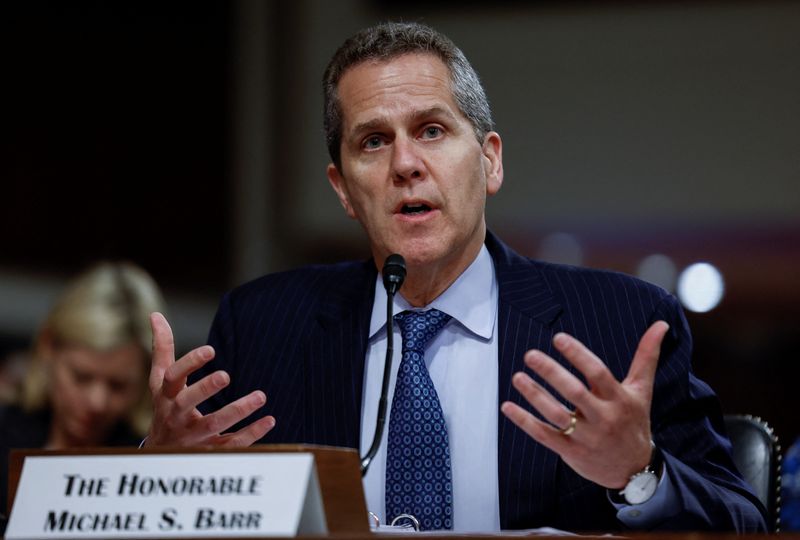By Michael S. Derby
NEW YORK (Reuters) -Michael Barr, the Federal Reserve's regulatory chief, said on Thursday that banks should put aside worries about the stigma of using the U.S. central bank's discount window liquidity facility and tap it when it makes sense for them.
"We view using the discount window as a fully acceptable, normal part of any bank's funding needs if it makes sense for them to use it from a financial perspective," Barr, the Fed's vice chair for supervision, said at a Treasury market conference hosted by the New York Fed.
His comments, which come as the Fed is preparing to propose new bank liquidity rules in coming months, indicated that using the discount window would not be seen as a sign that a bank had liquidity problems. Barr said the central bank is trying to eradicate a long-standing stigma surrounding this key part of the Fed's lending toolkit.
The discount window has traditionally been viewed as a source of emergency funding for banks facing liquidity challenges. Banks have long viewed discount window usage as sending a signal of distress and have shunned its use except during periods of deep stress.
While the Fed has been trying to encourage discount window usage for some time, those efforts have struggled to gain traction. Worries over the stigma of doing were so great that when banks faced a major bout of stress in the spring of 2023 the Fed stood up a separate lending facility to ensure they had the necessary liquidity.
While some Fed officials saw a quick and large jump in discount window borrowing during that period as a sign the facility works as intended, U.S. central bank research has warned that ad hoc actions will likely be needed in the future due to the persistence of the discount window stigma.
The stress of the spring of 2023 has also driven the Fed to make sure banks are broadly ready to use the discount window, as many weren't last year. Part of that effort has entailed banks pre-pledging collateral for discount-window loans.
Under new rules the Fed is readying, large banks may be required to maintain a minimum amount of readily available liquidity with a pool of reserves and pre-positioned collateral at the discount window, based on a fraction of their uninsured deposits, Barr has previously said.
The central bank is also considering limiting big banks' reliance on "held-to-maturity" assets in liquidity buffers, since liquidating such securities in times of market turmoil can actually increase stress on lenders.
Speaking during the Q&A session, Barr said those new rules would likely be proposed later this year or early next year.
'READILY AVAILABLE'
Barr noted in his prepared remarks that since the spring of 2023 "over $1 trillion in additional collateral has been pledged to the discount window."
The Fed's latest data on discount window readiness had shown an increase of about $700 billion in pre-pledged collateral from year-end 2022 to year-end 2023.
He added that banks have also been signing up to use the Fed's Standing Repo Facility, which allows eligible firms to hand Treasuries to the Fed for cash. Barr also flagged in his remarks a shift to allow banks' to use the discount window in assessments of their liquidity levels and ability to withstand periods of stress.
"We see it as acceptable and beneficial for firms to incorporate our facilities to meet liquidity needs in both planning and practice," Barr said.

Barr's comments contrasted with the views of Fed Governor Michelle Bowman, who on Thursday said she favored a more traditional set-up.
Bowman told the Mid-size Bank Coalition of America Board of Directors Workshop that non-emergency usage and required posting of collateral that could be used elsewhere could bring "unintended consequences."